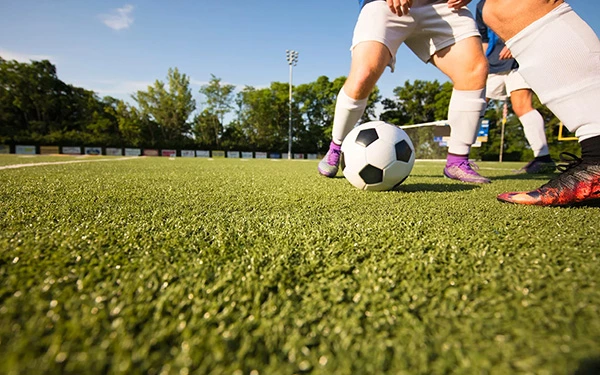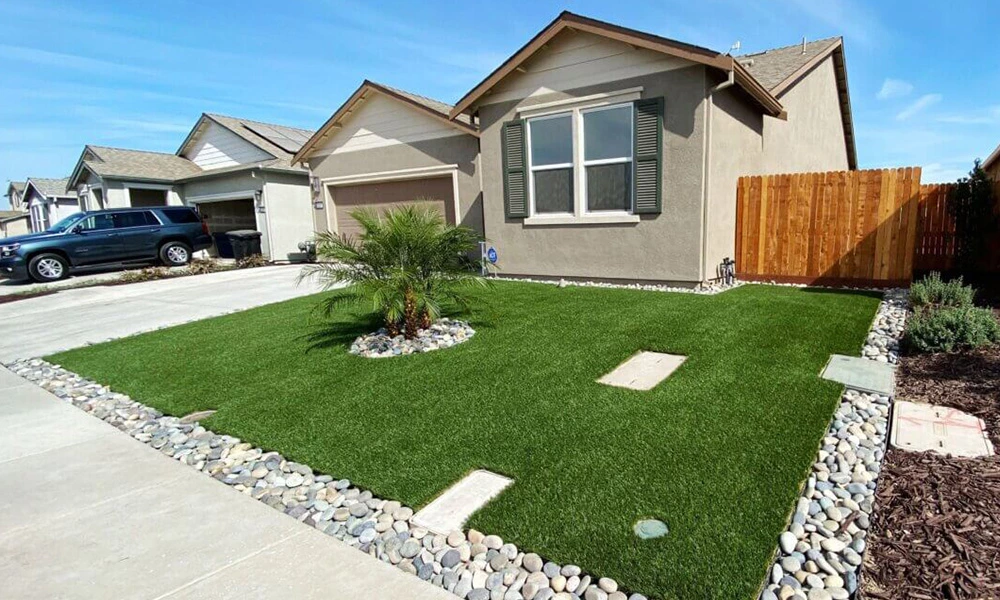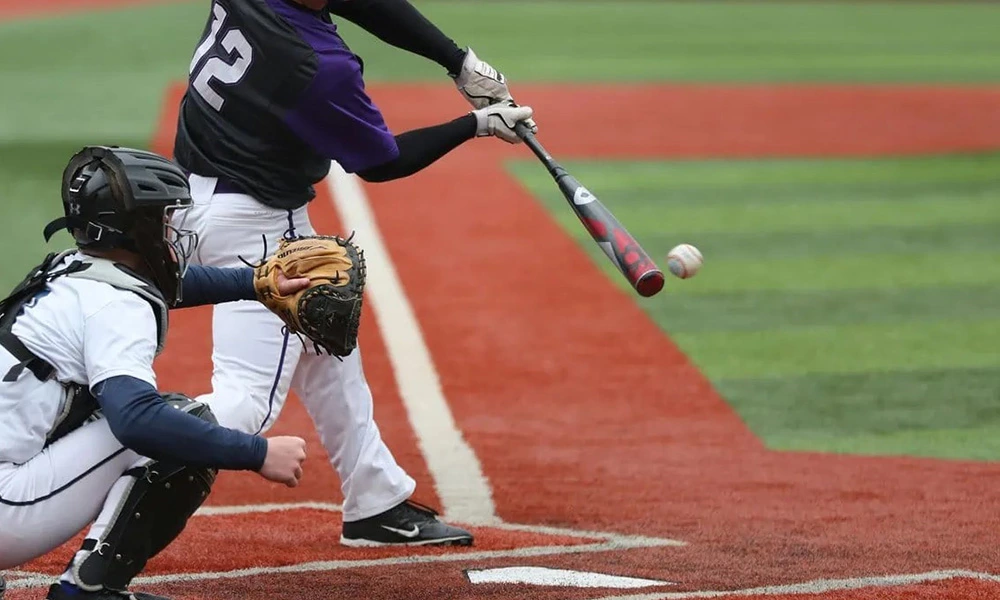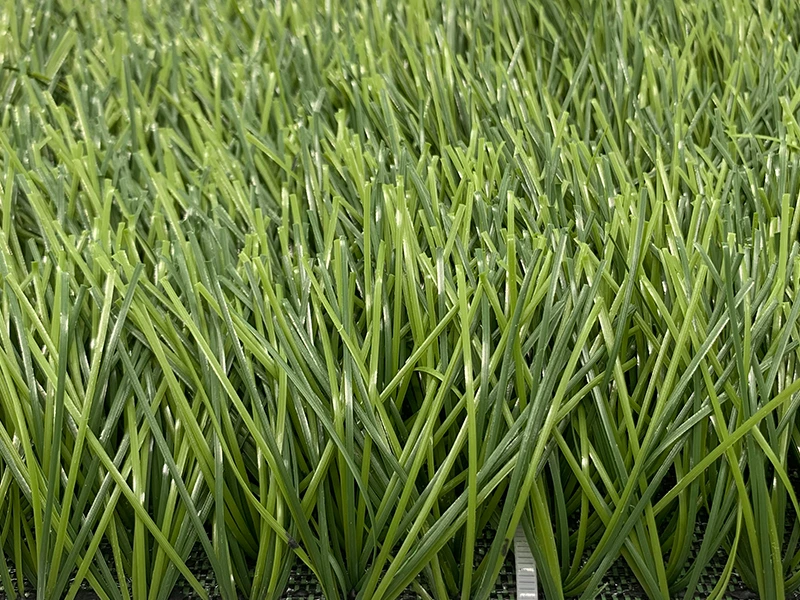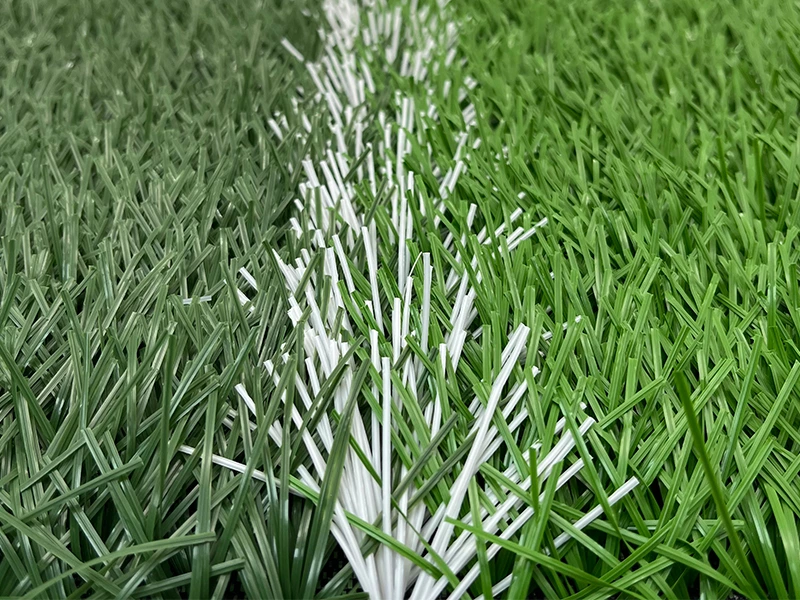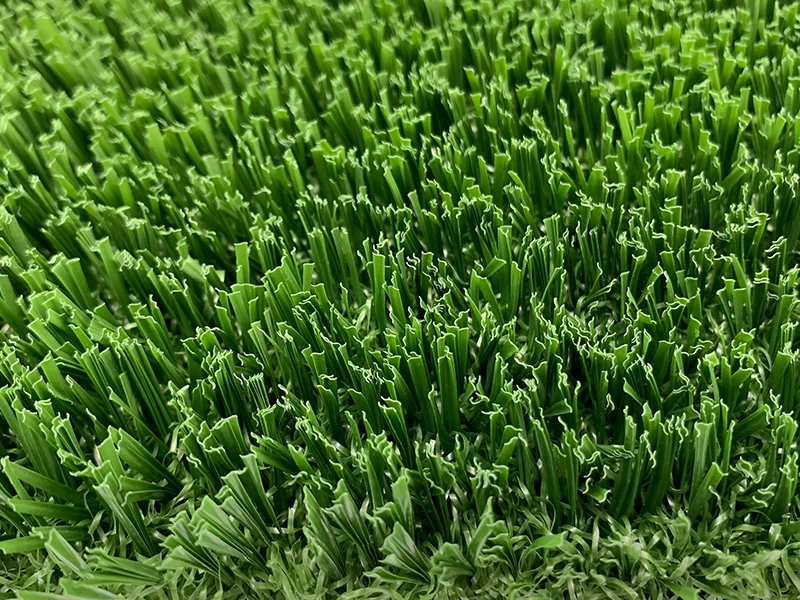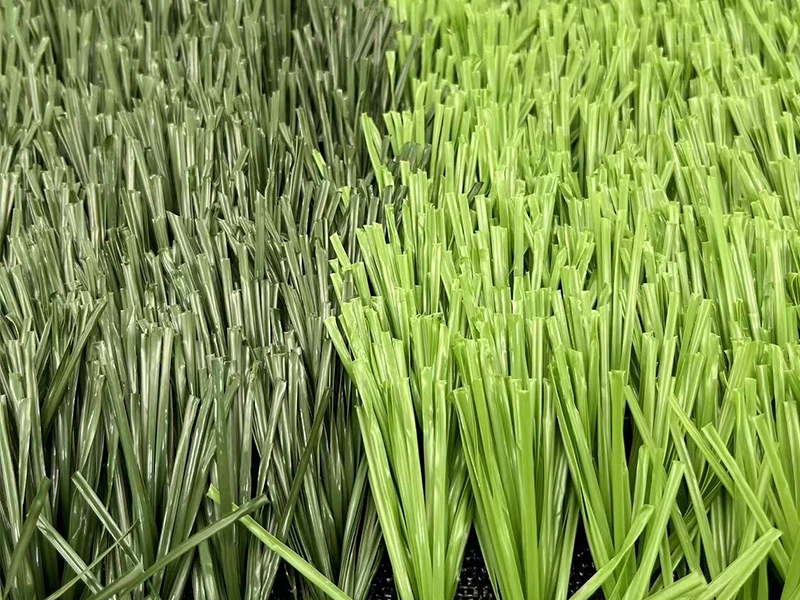What kind of artificial grass is used on sports fields?
With the advancement of science and technology and the improvement of the quality requirements for sports environment, artificial turf has gradually become the first choice for various sports venues. In particular, modern synthetic infill turf not only realistically restores natural grass in appearance, but also shows significant advantages in functionality, safety and economy. Different types of sports venues also have different performance requirements for turf. Choosing the right type of artificial turf is crucial to improving sports performance and protecting athletes.
Different Types of Artificial Turf
1. Fiber Material Classification
(1) PP (Polypropylene)
Advantages: Low cost, high cost-effectiveness, lightweight, and easy to install; acid and alkali resistant, corrosion resistant, suitable for temporary venues or light-use scenarios.Disadvantages: Relatively high hardness, slightly stiff underfoot with average elasticity; prone to aging under long-term exposure to sunlight, medium durability, and easy deformation under high-frequency use.
(2) PE (Polyethylene)
Advantages: Excellent softness, underfoot feel close to natural grass, and good elasticity; strong UV resistance and aging resistance, with durability superior to PP; wide application range, suitable for home gardens, leisure areas, and medium to low-frequency sports venues.
Disadvantages: Higher cost than PP; low-end PE has slightly weak wear resistance, requiring the selection of high-density models.
(3) PA (Nylon)
Advantages: High strength, excellent wear resistance, top-tier elasticity, and strong anti-aging and anti-lodging capabilities; suitable for high-frequency and high-intensity use scenarios such as football fields, tennis courts, and kindergarten activity areas.
Disadvantages: Highest cost among all types; softness inferior to PE, pure PA grass fibers feel slightly stiff underfoot, and low cost-effectiveness for home use.
(4) Mixed Materials (PE+PP / PE+PA)
Advantages: Combines the strengths of different materials—e.g., PE ensures softness, while PA/PP enhances wear resistance—balancing performance and cost, with full coverage of application scenarios.
Disadvantages: Requires precise formulation; low-quality mixed materials are prone to uneven performance issues.
2. Fiber Morphology Classification
Monofilament Turf: Fibers are single filaments, offering high realism, resistance to tangling, and wear resistance, making it the top choice for professional sports fields.
Net Fiber Turf: Fibers form a mesh structure, offering low cost and easy maintenance, suitable for school playgrounds and recreational sports fields.
Curled Fiber + Monofilament Hybrid: Balances elasticity and stability, suitable for multi-functional sports fields.
3. Infill Type Classification
Infilled Turf: Quartz sand + rubber granules (soccer fields, rugby fields), enhancing cushioning and rebound.
Uninfilled Turf: High-density self-supporting fibers (tennis courts, basketball courts), requiring no infill materials, easy maintenance.
Mixed Infill Turf: A small amount of rubber granules + environmentally friendly sponge padding (youth fields), enhancing safety.
Structural advantages of synthetic infill turf
Modern artificial turf is usually composed of the following three core layers:
Nylon or polyethylene fiber: simulates the appearance and touch of natural grass, with good wear resistance and elasticity;
Rubber particle filling layer: enhances the cushioning performance of the venue, reduces impact force, and reduces sports injuries;
Polyurethane cushion: improves the stability of the turf structure and provides secondary cushioning support.
This structure ensures that the turf has the advantages of durability, comfort, and safety, and is suitable for places with high intensity and high frequency of use.
Classification of sports field types
1. Professional Competitive Type
Designed to meet the certification standards of international sports organizations, all features are tailored to ensure competition fairness and athlete safety.
Football Field Turf: At the forefront of technological advancement, its performance strictly complies with FIFA Quality Standards. Typically constructed with high-density straight-curved mixed fibers, paired with high-performance elastic underlays and eco-friendly infill granules, it delivers exceptional shock absorption, resilience, and durability to withstand the rigors of professional matches. Slight variations in fiber density and infill volume cater to 11-a-side, 7-a-side, and 5-a-side pitches.
Rugby/American Football Field Turf: Demands higher impact absorption than football turf to cope with intense physical collisions. Featuring thicker fibers and a denser infill layer, it provides maximum protection for athletes during high-impact plays.
Tennis/Field Hockey Turf: Generally adopts an infill-free system with short, dense fibers (10-15mm pile height). Relying on its inherent structural performance or underlying cushioning layers, it ensures consistent ball speed, regular bounce, and optimal playing consistency, meeting ITF certification requirements.
2. Multi-Purpose Training Type
Commonly used in schools, club training grounds, and community sports centers, this type is engineered to withstand mixed-use scenarios including football, rugby, and frisbee. Balancing performance with practicality, it prioritizes durability, wear resistance, and cost-effectiveness. Typically equipped with medium-spec fibers and standard infill systems, it offers reliable performance for frequent training sessions.
3. Leisure & Recreational Type
Ideal for primary school playgrounds, kindergartens, community parks, and residential backyards, safety is the core priority. Boasting longer pile heights and softer infill layers, it delivers superior shock absorption to prevent injuries from falls. Adherence to stringent environmental and safety standards is non-negotiable, ensuring a child-friendly and eco-conscious surface.
4. Emerging Smart Systems
As the future development direction, emerging smart systems integrate cutting-edge technologies such as underground drainage and heating systems (enabling year-round use in freezing conditions), energy-efficient lighting, and built-in sensors for real-time monitoring of venue usage and athletes' performance data. Evolving from a conceptual stage to commercialization, these intelligent turf solutions are gradually entering the high-end market.
Demand for turf types in different sports
Soccer Field
Recommended grass height: 40–60mm
Recommended material: polyethylene fiber + SBR rubber filling
Advantages:
-
High grass density brings good ball rolling speed and direction control;
-
Good elasticity, reducing knee and ankle injuries;
-
Wear-resistant and step-resistant, suitable for large-scale competitions and high-frequency training.
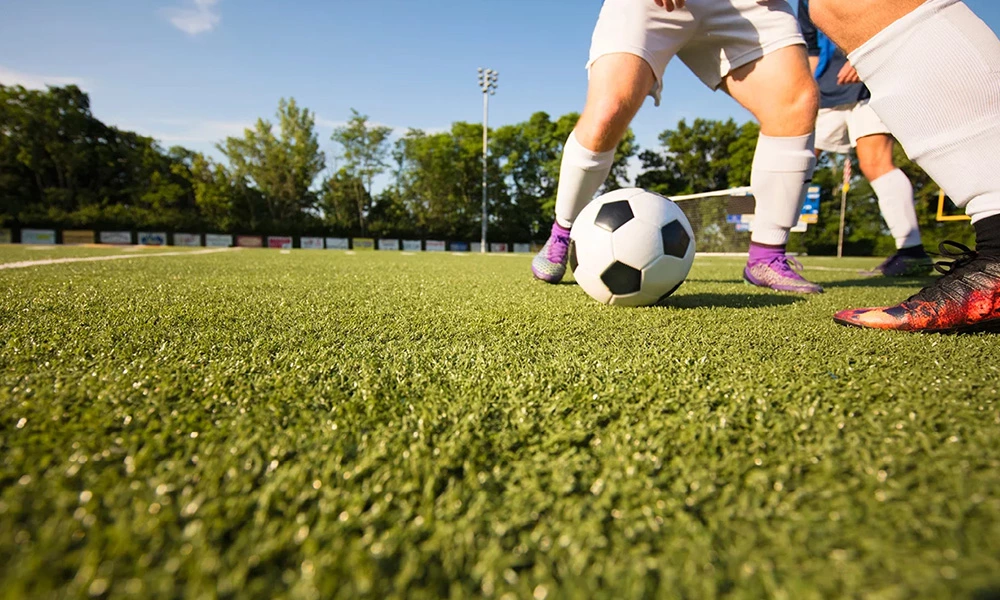
Rugby Field
Recommended grass height: 50–65mm
Recommended filling: TPE or EPDM environmentally friendly rubber particles
Advantages:
-
The thickened buffer layer protects athletes under fierce collisions;
-
The grass fiber is soft and does not pierce the skin, reducing the risk of abrasions;
-
Long grass fiber can prevent players from slipping.
Hockey Field
Recommended grass height: 13–18mm (water lawn)
Recommended structure: unfilled short-fiber grass + water spray system
Advantages:
-
Provides fast and stable ball speed;
-
The smooth lawn helps to control the ball accurately;
-
Commonly used in international events, the maintenance cost is lower than natural grass.
Tennis Court
Recommended grass height: 15–20mm
Recommended material: nylon or polypropylene staple fiber
Advantages:
-
Good ball rebound effect, suitable for fast play;
-
Possess moderate friction to reduce slipping;
-
Adapt to various climatic conditions and can be used all year round.
Multi-sport Fields
Recommended grass height: 25–30mm
Recommended design: composite fiber mixed grass + SBR filling
Advantages:
-
Meet the needs of different projects such as basketball, volleyball, and five-a-side football at the same time;
-
Suitable for use in community parks and school comprehensive sports fields;
-
Easy maintenance, long service life, and high cost performance.
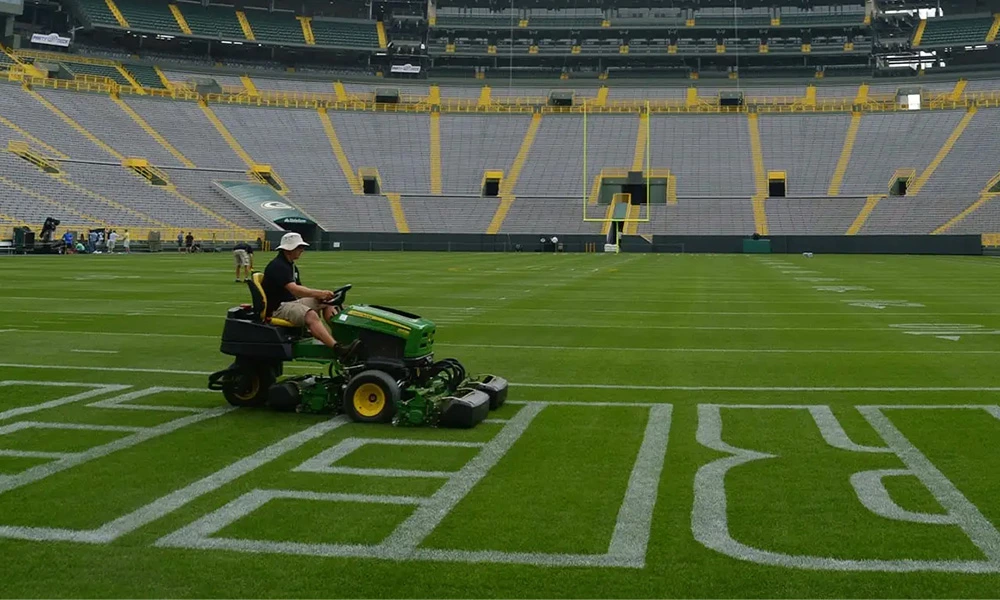
Comprehensive advantages of artificial turf
No matter what kind of sports, modern artificial turf shows the following common advantages:
1. Available all year round
Artificial grass is not restricted by weather, it is not muddy on rainy days, and it is not withered in winter, ensuring the operation of the sports field all year round.
2. Safety and environmental protection
Modern lawn materials do not contain heavy metals and meet environmental protection standards. Rubber particles are mostly made of environmentally friendly TPE or natural plant extracts to reduce damage to the environment and human body.
3. Low maintenance cost
No need for regular watering, fertilization or pruning, which greatly reduces the cost of venue operation.
4. Flexible installation
It can be quickly laid on concrete, asphalt or sand and gravel base, suitable for different indoor and outdoor scenes.
How to Choose Sports Field Artificial Turf?
Selecting artificial turf for sports fields is a process of comprehensive trade-off. Follow these steps:
1. Clarify Core Requirements
• What are the primary sports? Football, tennis, or multi-purpose use?
• What is the usage intensity? Professional training 8 hours a day or amateur activities several times a week?
• What is the budget? Including initial construction and total maintenance costs for the next 8-12 years.
• What is the local climate like? Rainy, intense sun, or freezing cold?
2. Evaluate Key Parameters
(1) Safety Indicators:
Impact Absorption: Higher values (e.g., ≥60%) provide better joint protection.
Vertical Deformation: Higher values (e.g., ≥9mm) mean a "softer" surface with superior cushioning.
Torque Decay (Traction): Values need to be moderate—excessively high may cause sprains, while excessively low can lead to slips.
(2) Sports Performance Indicators:
Ball Roll Distance: A critical metric for football fields, which must meet the requirements of the corresponding competition level.
Ball Rebound Rate: Affects the controllability of ball sports.
(3) Durability Indicators: UV resistance, wear rate, etc.
(4) Balance Long-Term Costs:
Initial Investment: Includes foundation construction, turf materials, infill, and installation fees.
Lifecycle Maintenance Costs: Regular grooming, infill replenishment, disinfection & cleaning, and repair of damages. High-quality products and proper maintenance can effectively extend the service life to over 10 years.
(5) Prioritize Environmental Friendliness & Health:
Prefer suppliers using eco-friendly infill (TPE/EPDM).
Verify if products have passed environmental certifications such as REACH and RoHS.
Consider system recyclability. Today, there are "green turf systems" that enable full-component recycling of fibers, infill granules, and backing fabrics.
Conclusion
Different types of sports venues correspond to artificial turfs with different structures and characteristics. By scientifically selecting artificial grass types, it can not only provide athletes with a safer and higher-performance sports experience, but also help operators reduce long-term maintenance costs. As a professional turf system provider, UNIGRASS can customize various sports turf solutions according to customer needs to help create a high-standard and sustainable sports venue environment.
If you need to select football fields, tennis courts, rugby fields, etc., we can provide detailed turf specifications, samples and technical support.

